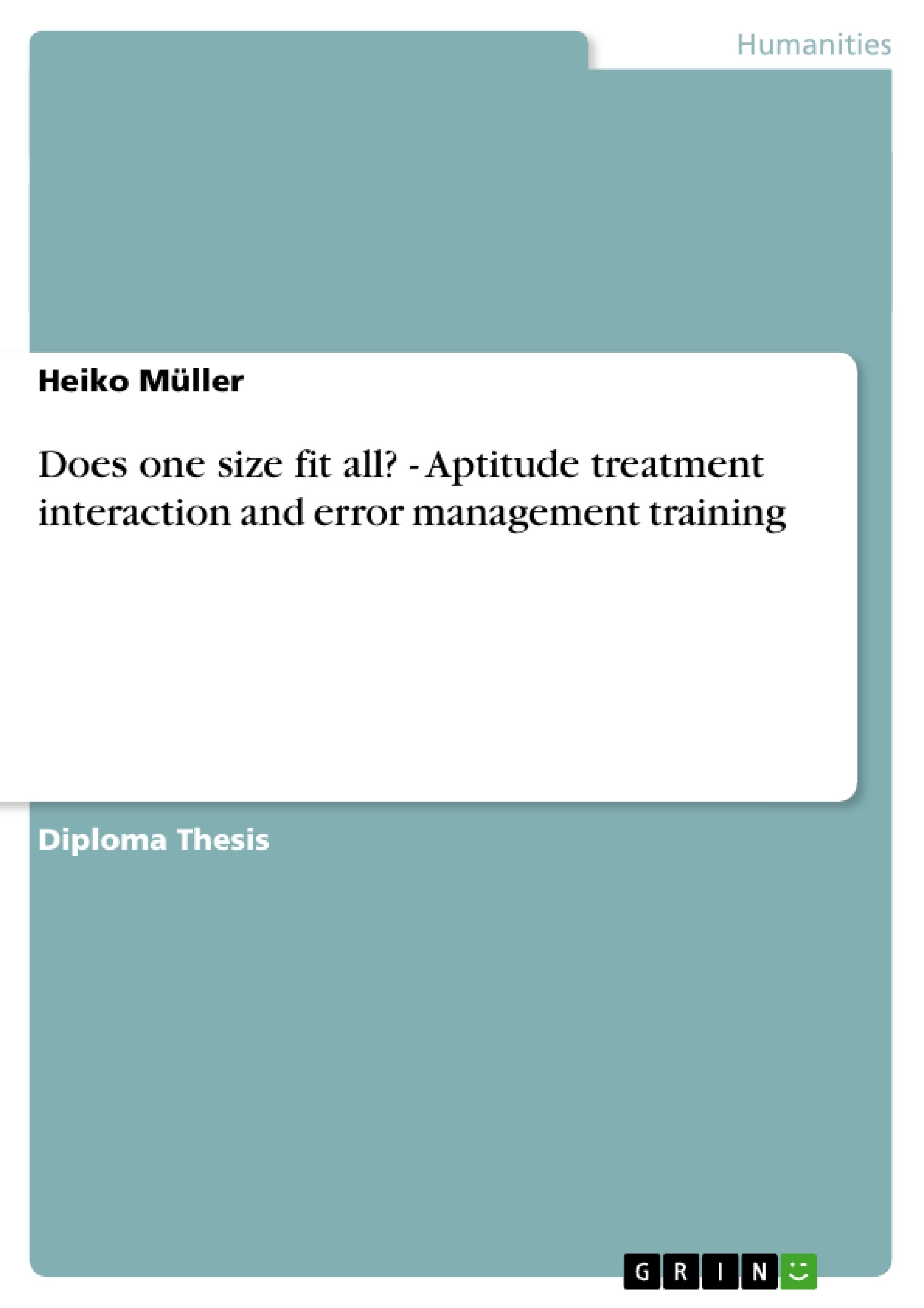Error-management-training - which explicitly allows participants to make errors during training - has been shown to lead to better test performance than error-avoidant training which tries to prevent participants from making errors. Recently some authors suggest to take personal characteristics of the learner into account when choosing the appropriate training for different individuals. We examined the effect of error-management-instructions (rules of thumb that encourage trainees to make errors and learn from them) and the impact of cognitive ability, neuroticism, openness to experience, conscientiousness, goal orientation, achievement motivation and learning strategies on performance depending on the training method. 109 participants took part in a group software training. The groups were randomly assigned to one of 4 training conditions: error training with and without error-management-instructions and error-avoidant training with and without error-management-instructions. Results showed no difference between the 4 training conditions in task performance and declarative knowledge. The error-management-instructions seem to be crucial to error training but obviously did not work in this study. We found 4 interactions that indicate a wipe out effect of error-management-training for the impact of personal characteristics on learning success.
Inhaltsverzeichnis (Table of Contents)
- 1. Introduction
- 1.1 Error-Management-Training
- 1.2 Error-Management-Instructions
- 1.3 Aptitude-Treatment-Interactions (ATI)
- 1.3.1 Learning strategies
- 1.3.2 Cognitive ability
- 1.3.3 Conscientiousness
- 1.3.4 Neuroticism
- 1.3.5 Openness to experience
- 1.3.6 Goal orientation
- 1.3.7 Achievement motivation
- 2. METHOD
- 2.1 Participants
- 2.2 Training Design
- 2.3 Procedure
- 2.4 Personal Variables
- 2.5 Dependant Variables
- 2.6 Manipulation Checks and Controls
- 3. RESULTS
- 3.1 Preliminary Analysis
- 3.2 Manipulation Checks
- 3.3 Performance Effects
- 3.4 Interactions of Personal Variables and Training Method
- 4. DISCUSSION
- 4.1 Strengths and Limitations of the Study
- 4.2 Implications for Theory and Future Research
- 5. REFERENCES
Zielsetzung und Themenschwerpunkte (Objectives and Key Themes)
This thesis examines the effectiveness of error-management-training in software training, considering the potential influence of various individual characteristics. The study aims to explore the interplay between different training methods (error-avoidant and error-management-training) and personal factors such as cognitive ability, personality traits, goal orientation, and learning strategies. It investigates whether the effectiveness of error-management-training depends on individual differences and if error-management-instructions are crucial for successful error-management-training.
- Effectiveness of Error-Management-Training
- Aptitude-Treatment-Interactions (ATI)
- Role of Individual Characteristics in Learning Success
- Influence of Error-Management-Instructions
- Comparison of Error-Avoidant and Error-Management Training Methods
Zusammenfassung der Kapitel (Chapter Summaries)
The introduction provides a comprehensive overview of error-management-training, explaining its principles and highlighting previous research findings. It discusses the importance of considering individual differences in training research and introduces the concept of aptitude-treatment-interactions (ATI). The chapter then explores the role of specific personal characteristics, such as learning strategies, cognitive ability, personality traits, goal orientation, and achievement motivation, in the context of ATI and their potential impact on learning success.
The second chapter details the methodology of the study. This includes information about the participants, training design, procedure, personal variables assessed, dependent variables measured, and manipulation checks used to ensure the effectiveness of the training conditions.
Chapter three presents the results of the study. It includes preliminary analyses, manipulation checks, performance effects, and the analysis of interactions between personal variables and training methods.
Schlüsselwörter (Keywords)
Error-management-training, aptitude-treatment-interactions (ATI), cognitive ability, neuroticism, openness to experience, conscientiousness, goal orientation, achievement motivation, learning strategies, error-avoidant training, software training, individual differences, personal characteristics, performance, learning success, error-management-instructions.
Frequently Asked Questions
What is Error-Management-Training (EMT)?
EMT is a training method that explicitly allows and encourages participants to make errors during the learning process, using them as opportunities to gain deeper understanding.
How does EMT compare to error-avoidant training?
Error-avoidant training tries to prevent mistakes during practice. While it may feel easier, EMT has been shown in previous research to lead to better test performance and adaptive transfer.
What are Aptitude-Treatment-Interactions (ATI)?
ATI refers to the concept that the effectiveness of a training method (treatment) may depend on the individual characteristics (aptitude) of the learner, such as their personality or cognitive ability.
Which personal characteristics were studied in this research?
The study examined cognitive ability, neuroticism, openness to experience, conscientiousness, goal orientation, achievement motivation, and learning strategies.
What are error-management-instructions?
These are "rules of thumb" provided during training that encourage trainees to view errors positively and learn from them, rather than being frustrated by them.
What was the "wipe out effect" found in the study?
The study found interactions suggesting that EMT might neutralize or "wipe out" the typical impact that certain personal characteristics have on learning success, potentially making the training more robust across different learners.
- Quote paper
- Heiko Müller (Author), 2003, Does one size fit all? - Aptitude treatment interaction and error management training, Munich, GRIN Verlag, https://www.grin.com/document/27159



